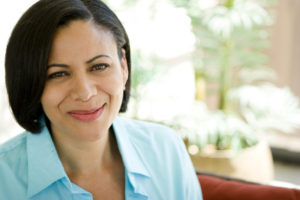Genetic Experts Important to Breast Cancer Team | by

Women who are diagnosed with breast cancer are faced with a myriad of information and decisions from how to treat the cancer to whether to have breast reconstruction. They rely on the expertise of health professionals to guide their decisions.
That’s why genetic experts, like Mary Freivogel, a certified genetic counselor at Invision Sally Jobe and president of the National Society of Genetic Counselors, underscores the need for genetic counselors to be part of breast cancer patients’ medical teams.
“Physicians are very good about what they do in practicing medicine. Some studies show some physicians even take extra measures to gain the expertise to interpret the results,” Freivogel says. “However, for those who don’t, they can misinterpret results, especially when testing results aren’t always black and white.”
Genetic results can be positive, negative or also “variants of uncertain significance,” also known as VUS. A genetic testing expert will know that VUS are generally benign variants, Freivogel says.
According to a recent Stanford University survey, one-quarter to one-half of breast cancer surgeons surveyed misinterpreted genetic tests. Moreover, in the same Stanford survey, nearly 1,000 women with cancer in one breast chose to have both breasts removed (a double mastectomy) after having genetic testing. Given the misinterpretation by breast cancer surgeons, Freivogel and other health experts are concerned.
“Overtreatment can occur when results are not interpreted the right way,” Freivogel says. “The Stanford survey shows women are slipping through the cracks.”
She says genetic counselors can ensure that doesn’t happen by helping women and breast cancer teams navigate test results and options.
Weighing Options
“Knowledge is power,” says Dr. Joyce Moore, a surgeon with Western Surgical Care and co-director of the Sky Ridge Breast Center. She has worked with breast cancer patients for decades. Moore utilizes genetic testing and the expertise of genetic counselors and oncologists to provide patients’ well-informed options. Moore says breast cancer survival rates, treatments and technology like gene testing have improved incredibly over the years.
Moore advises women who have been recently diagnosed with breast cancer and who meet the guidelines for genetic testing to wait for their genetic test results, which generally takes about two weeks, so they can better assess their options. It can be an extremely stressful time and women sometimes get impatient.
“Treatments are very specific to the patient,” Moore says. And, sometimes, even with a negative genetic test result, a patient with a cancer diagnosis in one breast, may still choose to undergo a double mastectomy after consultation with her surgeon weighing other factors such as future risk, physical appearance, the possibility of another surgery in the future and a host of other factors.
Genetic Experts
Genetic counselors help patients make informed choices. They help determine if patients should be tested and which type of test is relevant for them and their families’ knowledge.
Brittney Goetsch, a genetic counselor with Rocky Mountain Cancer Centers says Colorado, and the Denver-area in particular, has a strong genetic counseling culture. Doctors regularly refer patients to genetic counselors and make them part of a patient’s breast cancer team.
With regard to the Stanford study and VUS variants, Goetsch says genetic counselors are experts when it comes to genes: “They analyze what’s known about the [genetic] variant and will discuss it with the patient.”
Genes and Breast Cancer
About five to 10 percent of breast cancer has a hereditary component, according to the National Cancer Institute.
“There are 20 genes related to breast cancer at this point,” Goetsch says. Five of the most common genes are BRCA1 and BRCA2 (BReast CAncer gene one and two), ATM, Chek2 and PALB2. “BRCA1 and BRCA2 make up about 70 percent of most inherited cases of breast cancer.”
 Should You Get Gene Testing?
Should You Get Gene Testing?
Testing is generally only recommended to people with high risk indicators, which is linked to family history and/or known diagnosis of breast, ovarian or other cancers; breast cancer associated with Ashkenazi Jewish ancestry; or early onset cancers (before age 50).
For example, if you are over 60 or have no family history, it’s not likely hereditary, and may not be paid for by insurance. There are options, however, for testing as low as $250 if people want to pay out of pocket.
Those who want to know more and are curious can start investigating. “Be armed with information,” Freivogel says. “Find out your first circle (parents, child, siblings), second (aunts, uncles and grandparents) and third (cousins). Keep track of who, what type of cancer and the age she or he was diagnosed.”
If you find a history, then tell your OB-GYN or make an appointment with a genetic counselor. Goetsch says, “Knowing your family history of cancer is the first step.”
 Breast Cancer Reconstruction Options
Breast Cancer Reconstruction Options
When women are diagnosed with breast cancer, Dr. Christopher Williams, a surgeon with the Breast Center of Park Meadows Cosmetic Surgery, wants them to know they have options for breast reconstruction.
“Doing nothing is always an option,” Williams says. Some women want to focus on healing when first diagnosed, while others undergo reconstruction later. And some have reconstruction simultaneously with breast removal.
For those who opt for reconstruction, many prefer using tissue from their own body (autologous tissue) over implants. Among the autologous reconstruction techniques available, Williams and his partner Dr. Jeremy Williams prefer the DIEP Flap (Deep Inferior Epigastric Perforator) procedure. With DIEP Flap, excess skin and fat are carefully removed from the lower abdomen and used to form new breasts. The procedure preserves the patient’s abdominal musculature, which reduces the risk of weakness and hernia. Not all cosmetic surgeons perform the DIEP Flap. Notably, the Colorado duo perform the surgery together to reduce surgery time.
When patients are diagnosed with breast cancer, breast reconstruction can be part of the discussion sooner or later.
Tags: Breast Care Program
Leave a Comment
Please be respectful while leaving comments. All comments are subject to removal by the moderator.

